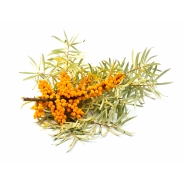1. What is Sea buckthorn?
Sea buckthorn (Hippophae rhamnoides L.) is a hardy, deciduous shrub belonging to the family Elaeagnaceae. It bears yellow or orange fruits that have been used for centuries in both Europe and Asia for food, therapeutic and pharmaceutical purpose.
In ancient Greece, leaves and yound branches were added to horse fodder which resulted in weight gain and healthy shine to the horse’s coat. The generic Latin name, Hippophae, derives from this practice as it means shining horse.
2. What is the origin of Sea buckthorn?
Documented in 1200 year ago earliest included Chinese Tibetan medicine classics – “Four Medical Classics”. This book includes records and information of sea-buckthorn in medical applications. The plant’s orange fruit with the oil from its pulp and seeds have been used traditionally for skin conditions, coughing, phlegm reduction, and digestive disorders.
A sea buckthorn industry has been thriving in Russia since the 1940’s when scientists there began investigating the biologically active substances found in fruit, leaves and bark.
3. Where can we find it ?
Sea buckthorn occurs as a native plant distributed widely throughout China, Mongolia, Russia and United kingdom, France, Denmark, Netherlands, Germany, Poland, Finland, Sweden and Norway.
4. What are the clinical implication of each part of Sea buckthorn ?
In examining the fatty acid profile of seabuckthorn seed, it contains nearly
90% unsaturated fat. It is high in both linolenic acid and linoleic acid relative to most other plant sources. The high level of unsaturated fat makes seabuckthorn seed appropriate for decreasing the risk of heart disease.
Also, sea buckthorn leaves and fruits are rich in flavonoids, such as leucocyanidin, catechin, flavonol (isorhamnetin, quercetin, quassin and camellin) while flavonoids are linked to a lower risk of heart disease. Studies show it may decrease peripheral vessel resistance to osmotic transfer and increase blood Vessel elasticity. Phenols are effective against oxidation, tumorigenesis and radiation. A total flavonoid extract from sea buckthorn has anti-myocardial, anti-hyperlipemia, and anti-fat-liver effects. It was shown to remit angina and improve cardiac rhythm, to improve functioning of the cardiovascular system, perhaps through a direct effect on the heart muscle and to treat coronary heart disease.






























